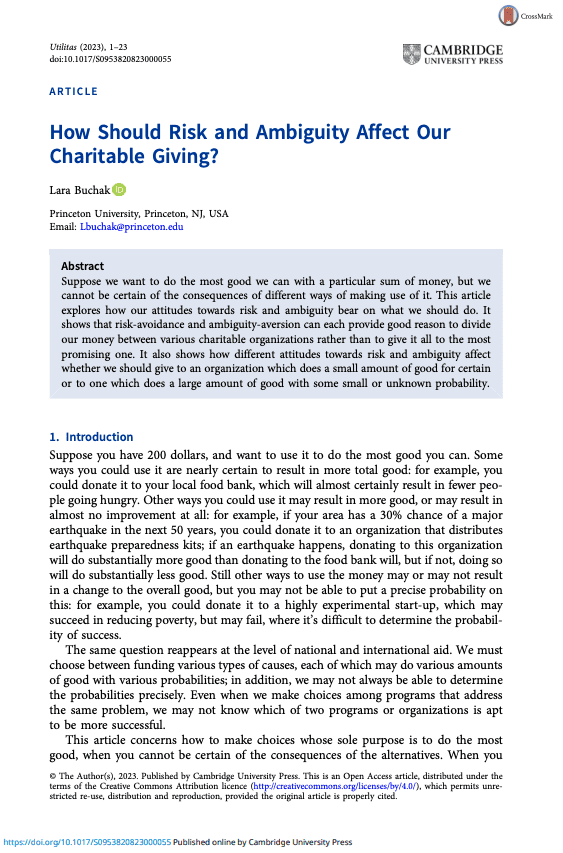How should risk and ambiguity affect our charitable giving?
Lara Buchak (Princeton University)
GPI Working Paper No. 8 - 2022, published in Utilitas
Suppose we want to do the most good we can with a particular sum of money, but we cannot be certain of the consequences of different ways of making use of it. This paper explores how our attitudes towards risk and ambiguity bear on what we should do. It shows that risk-avoidance and ambiguity-aversion can each provide good reason to divide our money between various charitable organizations rather than to give it all to the most promising one. It also shows on how different attitudes towards risk and ambiguity affect whether we should give to an organization which does a small amount of good for certain or to one which does a large amount of good with some small, unknown probability.
Other working papers
Longtermist institutional reform – Tyler M. John (Rutgers University) and William MacAskill (Global Priorities Institute, Oxford University)
There is a vast number of people who will live in the centuries and millennia to come. Even if homo sapiens survives merely as long as a typical species, we have hundreds of thousands of years ahead of us. And our future potential could be much greater than that again: it will be hundreds of millions of years until the Earth is sterilized by the expansion of the Sun, and many trillions of years before the last stars die out. …
Population ethical intuitions – Lucius Caviola (Harvard University) et al.
Is humanity’s existence worthwhile? If so, where should the human species be headed in the future? In part, the answers to these questions require us to morally evaluate the (potential) human population in terms of its size and aggregate welfare. This assessment lies at the heart of population ethics. Our investigation across nine experiments (N = 5776) aimed to answer three questions about how people aggregate welfare across individuals: (1) Do they weigh happiness and suffering symmetrically…
Are we living at the hinge of history? – William MacAskill (Global Priorities Institute, Oxford University)
In the final pages of On What Matters, Volume II, Derek Parfit comments: ‘We live during the hinge of history… If we act wisely in the next few centuries, humanity will survive its most dangerous and decisive period… What now matters most is that we avoid ending human history.’ This passage echoes Parfit’s comment, in Reasons and Persons, that ‘the next few centuries will be the most important in human history’. …

